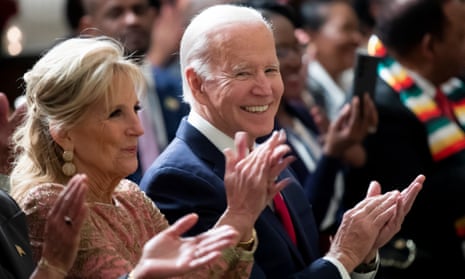Shelby: Government funding negotiations ‘only $25bn apart’
It’s been barely two months since the Senate last passed a short-term spending fix to avert a government shutdown, yet here we are again today.
Senators will on Thursday take up what has become something of a regular fixture in US politics as they discuss a one-week spending bill passed by the House on Wednesday to keep the government funded until 23 December.
And, as always, bipartisan politics are playing a role, even though Republican Senate minority leader Mitch McConnell has indicated he’s open to a long-term deal that many of his colleagues in the House have opposed.
Chuck Schumer, the Democratic majority leader, has his eyes on an appropriations package of roughly $1.7tn to fund an entire year, and a one-week extension before Friday’s deadline would avoid a partial government closure and provide breathing space for a compromise.

According to the Associated Press, Richard Shelby, the Republican senator for Alabama leading the negotiations, says the two sides are only about $25bn apart overall, and had agreed over an $858bn spend on defense.
McConnell said Wednesday night:
If a truly bipartisan full-year bill without poison pills is ready for final Senate passage by late next week, I’ll support it for our armed forces.
Otherwise, we’ll be passing a short-term continuing resolution into the new year.
Unsurprisingly, Republicans in the House want to stamp their own mark on things, given they take over control of the chamber in early January.
Kevin McCarthy, the Republican House minority leader vying for the Speaker’s gavel, points out that the two senators leading the negotiations, Shelby and Democrat Patrick Leahy of Vermont, are retiring and won’t still be around to be answerable for their work.
And No 2 House Republican Steve Scalise opposes the $1.7tn proposal saying it’s a sign “Congress failed to do its job”, even though, according to the AP, many Republican senators feel that blocking a long-term deal would reflect badly on the party.
But for today at least, it’s all about a short-term fix. Hopefully the picture will become clearer as the day moves on.
Key events
It’s the end of the road for the bust in the US Capitol of a supreme court judge who wrote a slavery ruling that helped pave the pathway to the civil war. Martin Pengelly reports:
The US House of Representatives voted on Wednesday to remove from the Capitol a bust of Roger Taney, the supreme court justice who in 1857 wrote the Dred Scott decision, justifying slavery and denying that Black people had rights any “white man was bound to respect”.
If the new measure is signed into law by Joe Biden, the bust will be removed from outside the old supreme court chamber and replaced by a bust of Thurgood Marshall, the first Black justice.
The measure that passed the House by voice vote was reduced from one which would also have removed statues of Confederates who fought the civil war to protect slavery and which was re-introduced in the aftermath of the Capitol riot of 6 January 2021, when Trump supporters carried Confederate flags into the Capitol.

On Wednesday, Zoe Lofgren, a House Democrat from California, said she would have preferred to remove Confederate statuary too, but to remove the Taney bust was literally about “who we put on a pedestal”.
“The United States Capitol is a beacon of democracy, freedom and equality,” said Lofgren, a member of the January 6 committee. “What and who we choose to honor in this building should represent our values. Chief Justice Taney … does not meet the standard.”
The Dred Scott case concerned an enslaved man who lived in Illinois and the Louisiana territory, where slavery was forbidden, then with his wife sued for freedom when taken back to Missouri, a state where slavery was legal.
The court ruled 7-2 for Scott’s enslaver, John Sandford, an army surgeon.
Taney wrote that Black people “had for more than a century before been regarded as beings of an inferior order, and altogether unfit to associate with the white race, either in social or political relations; and so far inferior, that they had no rights which the white man was bound to respect; and that the negro might justly and lawfully be reduced to slavery for his benefit”.
Read the full story:
Report: First lady ‘all in’ on new Biden presidential run
In what CNN is calling “a tidal shift”, Jill Biden has reportedly reversed her opinion about Joe Biden running again for the White House and is now “all in”.
The network published a report Thursday citing anonymous sources in the East Wing who say that after reluctance just three months ago, the first lady “has begun to say the quiet part out loud”.
Friends, CNN says, have “noticed a change” in Jill Biden’s demeanor since Democrats performed better in November’s midterms than expected, and has developed new enthusiasm for remaining in the White House, even though a flurry of recent events have left her “exhausted”.

Joe Biden is 80, and the first lady is 71.
The Bidens will discuss the issue “over the holidays”, the president said last month, telling reporters “watch me” at a press conference following the midterms when asked if he would be a candidate.
“I think everybody wants me to run, but we’re going to have discussions about it,” Biden said at the time, indicating that he would sit down with his family over the holiday period and announce his decision “early next year”.
If he does run and win, Biden would be 82 when sworn in for his second term, and be the oldest president in history. Politico reports that it’s been a touchy subject for the president. “You think I don’t know how fucking old I am?” he reportedly said to one ally earlier this year.
Voters, however, appear to have little appetite for a rematch between Biden and Donald Trump for the presidency in 2024, a poll released Wednesday found.
Roughly six in 10 Republicans, and the same margin in the Democratic party, don’t want their respective 2020 nominees to run again, according to the CNN poll conducted by SSRS.
Shelby: Government funding negotiations ‘only $25bn apart’
It’s been barely two months since the Senate last passed a short-term spending fix to avert a government shutdown, yet here we are again today.
Senators will on Thursday take up what has become something of a regular fixture in US politics as they discuss a one-week spending bill passed by the House on Wednesday to keep the government funded until 23 December.
And, as always, bipartisan politics are playing a role, even though Republican Senate minority leader Mitch McConnell has indicated he’s open to a long-term deal that many of his colleagues in the House have opposed.
Chuck Schumer, the Democratic majority leader, has his eyes on an appropriations package of roughly $1.7tn to fund an entire year, and a one-week extension before Friday’s deadline would avoid a partial government closure and provide breathing space for a compromise.

According to the Associated Press, Richard Shelby, the Republican senator for Alabama leading the negotiations, says the two sides are only about $25bn apart overall, and had agreed over an $858bn spend on defense.
McConnell said Wednesday night:
If a truly bipartisan full-year bill without poison pills is ready for final Senate passage by late next week, I’ll support it for our armed forces.
Otherwise, we’ll be passing a short-term continuing resolution into the new year.
Unsurprisingly, Republicans in the House want to stamp their own mark on things, given they take over control of the chamber in early January.
Kevin McCarthy, the Republican House minority leader vying for the Speaker’s gavel, points out that the two senators leading the negotiations, Shelby and Democrat Patrick Leahy of Vermont, are retiring and won’t still be around to be answerable for their work.
And No 2 House Republican Steve Scalise opposes the $1.7tn proposal saying it’s a sign “Congress failed to do its job”, even though, according to the AP, many Republican senators feel that blocking a long-term deal would reflect badly on the party.
But for today at least, it’s all about a short-term fix. Hopefully the picture will become clearer as the day moves on.
Good morning politics blog readers. The early order of business in the Senate today is finding a way to keep the government funded, if only for a week.
Senators will take up the one-week spending bill passed by the House on Wednesday, a short-term fix that, if also passed in the upper chamber, would avert a shutdown and keep the government machine ticking until 23 December.
It would also give Democratic majority leader Chuck Schumer breathing space to work on a $1.7tn fiscal year package, but Republicans are not happy about it. A clearer picture could emerge today.
Here’s what else we’re watching:
-
Nancy Pelosi is scheduled to give one of her final press conferences as House speaker at 10.45am.
-
Joe Biden is meeting African Union leaders in Washington DC to discuss US political and business ties with the continent. It’s unclear if he will talk to the press.
-
The House convenes shortly to discuss collective bargaining rights to Veterans’ Association health care workers. Statehood for Puerto Rico is also up for discussion.
-
Survivors of mass shootings in Uvalde, Texas; and Newtown, Connecticut will testify at a morning hearing of the House subcommittee on crime, terrorism and homeland security.
